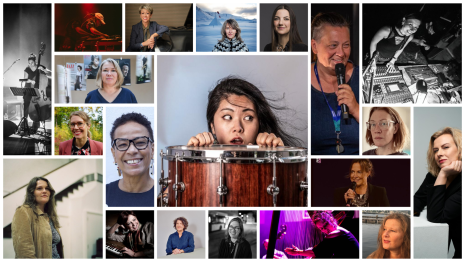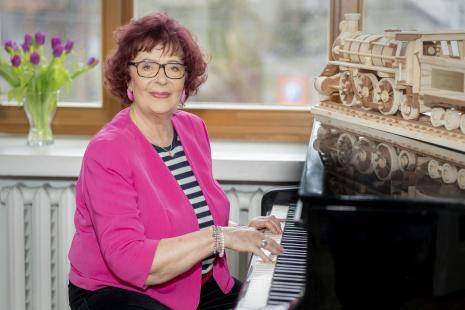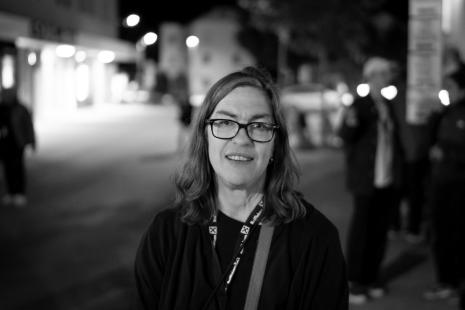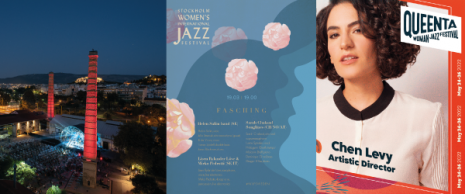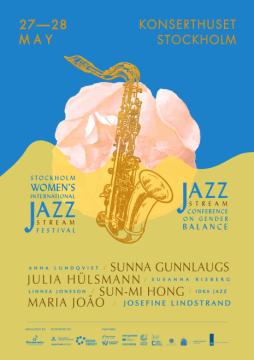Back to list
#WomenToTheFore 13: Sun-Mi Hong
We talk to Sun-Mi Hong, Netherlands-based drummer, composer and band leader.
How did you get into playing music originally, and who were your early mentors and influences?
I grew up in South Korea and loved to see the church band play at the front of the hall, that's how I got to know music. I also played the piano a little as a young girl.
When I was 12, I found myself drawn to the drums in particular - the way the kit sparkled and the huge sound it made. It came to me suddenly and this was the beginning of my journey getting to know this instrument.
I’m the oldest child in my family and there was a lot of expectation from my parents. They definitely didn’t think it was a good idea for me to play drums! So it took quite some time to start. I was 17 when they finally agreed that I could have lessons.
I had some very diverse and creative influences - my first teacher was an amateur heavy metal drummer and the next was a professional who encouraged me to do lots of practice and playing, and shared the ideas behind the music.
I had a lot of pressure from parents and teachers with my school studies but played the drums as much as I could. And that’s how the fire started!
How did it make you feel, when you were finally able to start playing the drums, five years after you’d first been drawn to them?
It was really liberating. I was a teenager and I wasn’t sure about what I wanted to do in life. Although I enjoyed going to karaoke everyday and dancing after school, I was in a bit of a grey period, though I think it can be like that for a lot of teenagers.
So for me, just being to learn something that I was so enthusiastic about was freeing. I felt that I could breathe and that I had made a new friend.
And how did you go from these first drum lessons aged 17 to studying in the Netherlands?
When my parents finally allowed me to get lessons, my dad let me know that he saw the drums as just a hobby.
After six months, I was enjoying it so much I told my parents that I thought this was my path for life, that I wanted to go to conservatoire and take it seriously. Of course they were not happy about this and my dad made a deal with me. He told me that if I could get into music school within a year that I could continue. Otherwise I would have to give up. It was their way of making me work hard!
My mum is a hairdresser and my dad built a practice studio for me under her shop. I practised there whenever I could, sometimes from after school until before school the next day - basically the whole night through. And I got a place in a good conservatoire in Seoul, which made my parents very happy.
After a year there I stopped - the journey was too quick and too fast. Music is something you learn over a lifetime. I loved playing drums but felt stuck, practising and practising. Then some of my teachers suggested that I learn jazz, so I could have more freedom and creativity in my playing. I started exploring jazz drummers on YouTube and researched options to learn jazz in Korea.
This was 13 years ago and. I realised I would have to go abroad if I wanted to study jazz. Initially, I thought it would have to be New York, but financially that wasn’t possible. But then I heard of colleagues going to the Netherlands to learn jazz, and discovered some amazing Dutch jazz musicians. All of a sudden I was studying them and transcribing Dutch jazz music. And that's what brought me here.
How did the composing side of things start for you?
One of the good things about the conservatoire in Amsterdam is that they encourage you to make your own music. Whether you’re a drummer or singer, you learn piano, chord changes, the basics. I wanted to experience all of it, so I took a composition class. At the time I didn’t speak a word of English and had no Dutch. I was 20 years old, had moved to the other side of the world, and there was no language that I could actually communicate in.
It’s crazy looking back on it, I’m not sure looking back whether I would make that choice again. For years it was difficult to communicate and that made it harder to make friends. You’re homesick and it’s really energy intensive to try to understand and connect with people.
So I was really lacking a way to truly express myself and composing (and drumming as well) became a way to access my loneliness. I couldn’t speak, but I could sit at a piano and play. It really made me feel like I could heal myself, it was like a musical hug.
Of course there's a deeper level of composing, it's complicated, you need to think about harmonies and forms, but for me there was a beauty in it that came from more of an expressive side.
How did your early career develop as a composer and musician?
After conservatoire, I really tried to make my name out there. I didn’t want to wait around for people to book me as a drummer, I wanted to make my own music too. It’s hard to make your living out of music when you’re not established, so I had a job on the side too.
I created my own band and spent every day sending emails, researching jazz clubs, festivals, creating a professional profile. I composed a lot and gathered musicians to rehearse and put 200% effort into my band and my music.
As a Korean in Europe, I need to pay for and renew my visa so I don’t have as much freedom as my European friends. I always need to think ahead and have a clear idea of my future goals - for example do I want to pursue citizenship or continue with other forms of visas.
There’s a thriving young scene in the Netherlands - very open and international with a collaborative spirit between many of the musicians? What do you find most interesting about being a young artist in the Netherlands at the moment?
The most inspiring thing is that we come from so many different countries and cultures. There’s a real energy and excitement; it feels like there are no boundaries.
Even though we are all living in the Netherlands and working as musicians, we have a completely different way of seeing and feeling things. This is fascinating and sometimes confusing to me!
I’m still finding out who I am and often wonder how different I might be if I had never left Korea. The scene here is so international, it’s prompted deep reflection on my identity and who and what I want to become. I’ve been thinking about this for over ten years and only recently do I feel like I’m on my path. I know what I want to do and what makes me happy. This is a life journey for me.
How would you describe your music?
Composing has so many directions to it, it gives you great freedom. It’s part of the way I reflect on life itself and who I am.
At the beginning of my composing career, I saw more darkness and sorrow but time passes and I now see more beauty in it. My music can be melancholic and emotionally heavy but now it’s becoming more free. Album by album I can sense more freedom in the music and that’s a pretty direct connection to where I am in my life’s journey.
What project are you most excited by at the moment?
My main project is my Quintet and we’re releasing our fourth album next year with Edition Records.
I’m also recording an album with another group that will be released by Bimhuis. It’s a live album and that feels really exciting. It’s a very international band - I hadn’t played with half of them before. I kind of gambled and invited these people to really bond and make music together.
I also have a group based in London, so I come to the UK quite often. And I have been collaborating with European artists, including Petter Eldh, a Swedish bass player, and Kit Downes.
It’s really exciting to collaborate, and I want to extend my network. I'm very curious about who is out there. I love to play together with someone new, because I think it's much better than just having a coffee. Have a session and you can really get to know each other and whether you click. Then you know whether a collaboration is possible!
How did you get into playing music originally, and who were your early mentors and influences?
I grew up in South Korea and loved to see the church band play at the front of the hall, that's how I got to know music. I also played the piano a little as a young girl.
When I was 12, I found myself drawn to the drums in particular - the way the kit sparkled and the huge sound it made. It came to me suddenly and this was the beginning of my journey getting to know this instrument.
I’m the oldest child in my family and there was a lot of expectation from my parents. They definitely didn’t think it was a good idea for me to play drums! So it took quite some time to start. I was 17 when they finally agreed that I could have lessons.
I had some very diverse and creative influences - my first teacher was an amateur heavy metal drummer and the next was a professional who encouraged me to do lots of practice and playing, and shared the ideas behind the music.
I had a lot of pressure from parents and teachers with my school studies but played the drums as much as I could. And that’s how the fire started!
How did it make you feel, when you were finally able to start playing the drums, five years after you’d first been drawn to them?
It was really liberating. I was a teenager and I wasn’t sure about what I wanted to do in life. Although I enjoyed going to karaoke everyday and dancing after school, I was in a bit of a grey period, though I think it can be like that for a lot of teenagers.
So for me, just being to learn something that I was so enthusiastic about was freeing. I felt that I could breathe and that I had made a new friend.
And how did you go from these first drum lessons aged 17 to studying in the Netherlands?
When my parents finally allowed me to get lessons, my dad let me know that he saw the drums as just a hobby.
After six months, I was enjoying it so much I told my parents that I thought this was my path for life, that I wanted to go to conservatoire and take it seriously. Of course they were not happy about this and my dad made a deal with me. He told me that if I could get into music school within a year that I could continue. Otherwise I would have to give up. It was their way of making me work hard!
My mum is a hairdresser and my dad built a practice studio for me under her shop. I practised there whenever I could, sometimes from after school until before school the next day - basically the whole night through. And I got a place in a good conservatoire in Seoul, which made my parents very happy.
After a year there I stopped - the journey was too quick and too fast. Music is something you learn over a lifetime. I loved playing drums but felt stuck, practising and practising. Then some of my teachers suggested that I learn jazz, so I could have more freedom and creativity in my playing. I started exploring jazz drummers on YouTube and researched options to learn jazz in Korea.
This was 13 years ago and. I realised I would have to go abroad if I wanted to study jazz. Initially, I thought it would have to be New York, but financially that wasn’t possible. But then I heard of colleagues going to the Netherlands to learn jazz, and discovered some amazing Dutch jazz musicians. All of a sudden I was studying them and transcribing Dutch jazz music. And that's what brought me here.
How did the composing side of things start for you?
One of the good things about the conservatoire in Amsterdam is that they encourage you to make your own music. Whether you’re a drummer or singer, you learn piano, chord changes, the basics. I wanted to experience all of it, so I took a composition class. At the time I didn’t speak a word of English and had no Dutch. I was 20 years old, had moved to the other side of the world, and there was no language that I could actually communicate in.
It’s crazy looking back on it, I’m not sure looking back whether I would make that choice again. For years it was difficult to communicate and that made it harder to make friends. You’re homesick and it’s really energy intensive to try to understand and connect with people.
So I was really lacking a way to truly express myself and composing (and drumming as well) became a way to access my loneliness. I couldn’t speak, but I could sit at a piano and play. It really made me feel like I could heal myself, it was like a musical hug.
Of course there's a deeper level of composing, it's complicated, you need to think about harmonies and forms, but for me there was a beauty in it that came from more of an expressive side.
How did your early career develop as a composer and musician?
After conservatoire, I really tried to make my name out there. I didn’t want to wait around for people to book me as a drummer, I wanted to make my own music too. It’s hard to make your living out of music when you’re not established, so I had a job on the side too.
I created my own band and spent every day sending emails, researching jazz clubs, festivals, creating a professional profile. I composed a lot and gathered musicians to rehearse and put 200% effort into my band and my music.
As a Korean in Europe, I need to pay for and renew my visa so I don’t have as much freedom as my European friends. I always need to think ahead and have a clear idea of my future goals - for example do I want to pursue citizenship or continue with other forms of visas.
There’s a thriving young scene in the Netherlands - very open and international with a collaborative spirit between many of the musicians? What do you find most interesting about being a young artist in the Netherlands at the moment?
The most inspiring thing is that we come from so many different countries and cultures. There’s a real energy and excitement; it feels like there are no boundaries.
Even though we are all living in the Netherlands and working as musicians, we have a completely different way of seeing and feeling things. This is fascinating and sometimes confusing to me!
I’m still finding out who I am and often wonder how different I might be if I had never left Korea. The scene here is so international, it’s prompted deep reflection on my identity and who and what I want to become. I’ve been thinking about this for over ten years and only recently do I feel like I’m on my path. I know what I want to do and what makes me happy. This is a life journey for me.
How would you describe your music?
Composing has so many directions to it, it gives you great freedom. It’s part of the way I reflect on life itself and who I am.
At the beginning of my composing career, I saw more darkness and sorrow but time passes and I now see more beauty in it. My music can be melancholic and emotionally heavy but now it’s becoming more free. Album by album I can sense more freedom in the music and that’s a pretty direct connection to where I am in my life’s journey.
What project are you most excited by at the moment?
My main project is my Quintet and we’re releasing our fourth album next year with Edition Records.
I’m also recording an album with another group that will be released by Bimhuis. It’s a live album and that feels really exciting. It’s a very international band - I hadn’t played with half of them before. I kind of gambled and invited these people to really bond and make music together.
I also have a group based in London, so I come to the UK quite often. And I have been collaborating with European artists, including Petter Eldh, a Swedish bass player, and Kit Downes.
It’s really exciting to collaborate, and I want to extend my network. I'm very curious about who is out there. I love to play together with someone new, because I think it's much better than just having a coffee. Have a session and you can really get to know each other and whether you click. Then you know whether a collaboration is possible!
Can you tell us about one of your most memorable moments of music making?
It was with my Quintet, about two or three years after we started playing together. We were playing a lot of concerts, about 25 to 30 every year.
It was intense and I was struggling being a band leader and a composer. It's like you own the company and you're the chair, the treasurer - you do everything and then you’re exhausted by the time you get on stage.
I found I wasn’t enjoying performing because I was so tired from all the other work that came with it. It was a really difficult time for me and my band members were helping me a lot, helping me to really be in the music. There was one concert in the Netherlands which was intense because we put everything we had into it. And I remember coming off the stage and crying because of all the feelings and another person crying because it was so overwhelming.
But what we experienced together was such a sensitive thing, nobody can judge us, nobody can really know what it was like to perform together at that gig on that night. It has a magic to it, and we really felt all those emotions together at the end of that concert.
It was with my Quintet, about two or three years after we started playing together. We were playing a lot of concerts, about 25 to 30 every year.
It was intense and I was struggling being a band leader and a composer. It's like you own the company and you're the chair, the treasurer - you do everything and then you’re exhausted by the time you get on stage.
I found I wasn’t enjoying performing because I was so tired from all the other work that came with it. It was a really difficult time for me and my band members were helping me a lot, helping me to really be in the music. There was one concert in the Netherlands which was intense because we put everything we had into it. And I remember coming off the stage and crying because of all the feelings and another person crying because it was so overwhelming.
But what we experienced together was such a sensitive thing, nobody can judge us, nobody can really know what it was like to perform together at that gig on that night. It has a magic to it, and we really felt all those emotions together at the end of that concert.
Do you have any particular inspirations or influences on your composing?
In the beginning, I loved to have a band sound like Wayne Shorter Quartet and Miles Davis’s second quintet. I am also getting more and more interested in classical music, Ravel and Bartók in particular. I’ve loved the music of Christian Wallurød, a Norwegian composer and piano player, for many years. And Robert Landfermann, a German bass player, is another composer I admire.
Who are the women and non-binary people you work with who inspire you the most, and which female/non-binary artists are you most excited about at the moment?
I have enormous admiration for female musicians who are also mums. I have no clue how they juggle things and still be on fire to create music. They're really strong. I’m at that age so it’s something I think about a lot, it might be part of my story in the future.
I recently played with Mette Rasmussen, a Danish saxophone player. Mette lives in Trondheim in Norway and is just a fantastic musician and a very warm person. On stage she plays like there's no tomorrow, which really blows everyone's mind each time she performs. I really admire her as well. I learned a lot from her attitude and I think we have a similar energy, because I'm also a bit more fiery when I’m on the stage.
I’ve also performed with the legendary bass player Joëlle Léandre and we’re collaborating this summer in Germany. She really fascinates me too.
In the beginning, I loved to have a band sound like Wayne Shorter Quartet and Miles Davis’s second quintet. I am also getting more and more interested in classical music, Ravel and Bartók in particular. I’ve loved the music of Christian Wallurød, a Norwegian composer and piano player, for many years. And Robert Landfermann, a German bass player, is another composer I admire.
Who are the women and non-binary people you work with who inspire you the most, and which female/non-binary artists are you most excited about at the moment?
I have enormous admiration for female musicians who are also mums. I have no clue how they juggle things and still be on fire to create music. They're really strong. I’m at that age so it’s something I think about a lot, it might be part of my story in the future.
I recently played with Mette Rasmussen, a Danish saxophone player. Mette lives in Trondheim in Norway and is just a fantastic musician and a very warm person. On stage she plays like there's no tomorrow, which really blows everyone's mind each time she performs. I really admire her as well. I learned a lot from her attitude and I think we have a similar energy, because I'm also a bit more fiery when I’m on the stage.
I’ve also performed with the legendary bass player Joëlle Léandre and we’re collaborating this summer in Germany. She really fascinates me too.
Have there been particular challenges for you as a female artist and composer?
Even though one of the reasons I moved to the Netherlands was to escape a very male-orientated jazz world in Korea back then, I feel that by being in this generation I got really lucky. Because people are more vocal about the issues and also everyone tries to have a gender balance in their line-up and bring more female musicians onto stages. Before it was a hard time. I know some of these women in the previous generation well and I admire them for surviving it - like wheat growing from concrete basically?
So I haven’t had many difficulties in that sense - since I moved to the Netherlands I’m riding this wave. But being a female and from an Asian country in Europe can be an advantage and a disadvantage at the same time. I have to be very good at what I do, the right balance of being good and female and Asian! I wouldn’t be satisfied if people booked me only because I'm a woman, so I work as hard as I can. I think that's a bit of a downside for me.
We are still surrounded by men in bands and at conservatoires. I think that standing strong and knowing who you are is so important. Don’t try to be different but really try to be you. It sounds similar but it's a completely different thing.
Musicians want to be special and want to be recognised as soon as possible, but the most important thing is to develop your own personal colour and that is a difficult but rewarding journey.
What are your aspirations for the future and what ambitions do you still want to fulfil?
I'm enthusiastic about teaching younger people and sharing my knowledge - I’ve been invited to a few jazz summer schools and as a guest tutor at conservatoires. I also want to expand my networks and meet more people to play with. I feel like the possibilities are infinite really!
I don’t want to get too comfortable and stuck in my environment, I want to challenge myself to go out and meet other people to experience something more challenging.
Hear from Sun-Mi in this New Generation documentary about her story.
Even though one of the reasons I moved to the Netherlands was to escape a very male-orientated jazz world in Korea back then, I feel that by being in this generation I got really lucky. Because people are more vocal about the issues and also everyone tries to have a gender balance in their line-up and bring more female musicians onto stages. Before it was a hard time. I know some of these women in the previous generation well and I admire them for surviving it - like wheat growing from concrete basically?
So I haven’t had many difficulties in that sense - since I moved to the Netherlands I’m riding this wave. But being a female and from an Asian country in Europe can be an advantage and a disadvantage at the same time. I have to be very good at what I do, the right balance of being good and female and Asian! I wouldn’t be satisfied if people booked me only because I'm a woman, so I work as hard as I can. I think that's a bit of a downside for me.
We are still surrounded by men in bands and at conservatoires. I think that standing strong and knowing who you are is so important. Don’t try to be different but really try to be you. It sounds similar but it's a completely different thing.
Musicians want to be special and want to be recognised as soon as possible, but the most important thing is to develop your own personal colour and that is a difficult but rewarding journey.
What are your aspirations for the future and what ambitions do you still want to fulfil?
I'm enthusiastic about teaching younger people and sharing my knowledge - I’ve been invited to a few jazz summer schools and as a guest tutor at conservatoires. I also want to expand my networks and meet more people to play with. I feel like the possibilities are infinite really!
I don’t want to get too comfortable and stuck in my environment, I want to challenge myself to go out and meet other people to experience something more challenging.
Hear from Sun-Mi in this New Generation documentary about her story.
Image credits:
1. Petra Beckers
2. Ho Sung Joo
1. Petra Beckers
2. Ho Sung Joo
